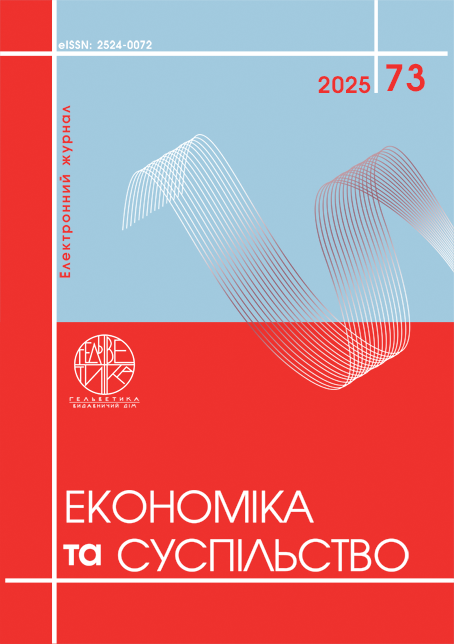PROSPECTIVE VECTORS OF PRACTICAL IMPLEMENTATION OF SMART CONTRACT TECHNOLOGY BY DIGITAL BUSINESS-ECOSYSTEMS
Abstract
The article is devoted to the analysis of smart contract technology, which has recently qualitatively transformed traditional business processes in the context of accelerating digitalization processes. Smart contracts allow business structures to automatically fulfill their contractual obligations and exclude the intervention of a trusted third party. The article establishes that it is the development of blockchain technologies that has led to a revolution in the field of digital economy and has given rise to such a tool as a smart contract. Smart contracts operate on an if-then basis, meaning that certain actions will only be performed if certain conditions are met. The term “smart contract” has become quite widespread. It is used not only in the scientific field, but also in practical activities, including international business entities. At the same time, there is no generally accepted approach to determining the essence of this definition. The purpose of the study is to identify the main problems that exist both in modern approaches to defining smart contracts and the difficulties that companies may encounter when applying them in their business practice. To achieve the outlined goal, the article considers the main approaches to understanding the definition of “smart contract”. A retrospective study of the formation of the concept of “smart contract” is conducted. The paper analyzes the essence of the concept of "smart contract", provides the basics of the blockchain mechanisms on the basis of which smart contracts are formed. An analysis of the positive and negative characteristics of smart contracts is made, examples of practical application of smart contracts today are also analyzed, and potential areas of application of the technology are highlighted. The fundamental functions of smart contracts were identified. The implementation algorithm and main components of a smart contract are presented. The article provides an overview of smart contracts and potential options for their practical implementation in business ecosystems in modern highly turbulent development conditions.
References
2. Josefy M., Kuban S., Ireland R.D., Hitt M.A.. All things great and small: Organizational size, boundaries of the firm, and a changing environment. The Academy of Management Annals. Vol.9, 2015: 715–802
3. Seidel, M-D. L., Questioning centralized organizations in a time of distributed trust. Journal of Management Inquiry. Vol. 27, 2018: 40–44.
4. Allam Z. On smart contracts and organizational performance: A review of smart contracts through the blockchain technology. Review of Economic and Business Studies. Vol.11(2), 2018.: 137–156.
5. DeCenter офіційний сайт URL: https://decenter.org/ (дата звернення: 07.04.2025)
6. Тapscott D., Tapscott A., 2016. Blockchain Revolution: How the technology behind Bitcoin is changing money, business, and the world, 1st Edition, Penguin.
7. Khan, S.N., Loukil, F., Ghedira-Guegan, C. Blockchain smart contracts: Applications, challenges, and future trends. Peer-to-Peer Netw. Appl. 14, 2901–2925 (2021). https://doi.org/10.1007/s12083-021-01127-0 (дата звернення: 07.04.2025)
8. Мамчур Л., Недибалюк О. Цивільно-правові реалії допустимості використання смарт-контракту у договірних відносинах. Історико-правовий часопис: науковий журнал. 2018. N 2 (12). С. 90–94.
9. Клименко І.В., Лозова Г.М., Акімова Л.П. Застосування Blockchain-технологій у публічному управлінні. Науковий вісник «Демократичне Врядування» 2017. Вип. 20. URL: http://lvivacademy.com/vidavnitstvo_1/visnyk20/fail/Klymenko,Lozova,Akimova.pdf (дата звернення: 07.04. 2025)
10. K. Upadhyay, R. Dantu, Z. Zaccagni and S. Badruddoja, "Is Your Legal
11. Contract Ambiguous? Convert to a Smart Legal Contract," 2020 IEEE
12. International Conference on Blockchain (Blockchain), Rhodes, Greece,
13. 2020, pp. 273-280, doi: 10.1109/Blockchain50366.2020.00041
1. Szabo, N. (1996), Smart Contracts: Building Blocks for Digital Markets. Available at: http://www.fon.hum.uva.nl/rob/Courses/InformationInSpeech/CDROM/Literature/LOTwinterschool2006/szabo.best.vwh.net/smart_contracts_2.html (accessed April 5, 2025).
2. Josefy, M., Kuban, S., Ireland, R.D. and Hitt, M.A. (2015), “All things great and small: Organizational size, boundaries of the firm, and a changing environment”. The Academy of Management Annals, vol.9, pp. 715–802
3. Seidel, M-D. L. (2018), “Questioning centralized organizations in a time of distributed trust”. Journal of Management Inquiry, vol.27, pp. 40–44
4. Allam, Z. (2018), “On smart contracts and organizational performance: A review of smart contracts through the blockchain technology”. Review of Economic and Business Studies, vol.11(2), pp.137–156
5. DeCenter official site Available at: https://decenter.org/ (accessed April 7, 2025)
6. Tapscott, D., Tapscott, A. (2016), “Blockchain Revolution: How the technology behind Bitcoin is changing money, business, and the world”, 1st Edition, Penguin
7. Khan, S.N., Loukil, F., Ghedira-Guegan, C. (2021), “Blockchain smart contracts: Applications, challenges, and future trends”. Peer-to-Peer Network. Appl. 14, pp.2901–2925. Available at https://doi.org/10.1007/s12083-021-01127-0 (accessed April 7, 2025)
8. Mamchur, L., Nedybalyuk, O. (2018), Tsyvilno-pravovi realiyi dopustymosti vykorystannya smart-kontraktu u dohovirnykh vidnosynakh [Civil and legal realities of the admissibility of using a smart contract in contractual relations]. Istoryko-pravovyy chasopys: naukovyy zhurnal, vol.2 (12), pp. 90–94.
9. Klymenko, I.V., Lozova, H.M., Akimova, L.P. (2017). Zastosuvannya Blockchain-tekhnolohiy u publichnomu upravlinni [Application of Blockchain technologies in public administration”], Naukovyy visnyk «Demokratychne Vryaduvannya», vol. 20. Available at: http://lvivacademy.com/vidavnitstvo_1/visnyk20/fail/Klymenko,Lozova,Akimova.pdf (accessed April 07, 2025)

This work is licensed under a Creative Commons Attribution 4.0 International License.


